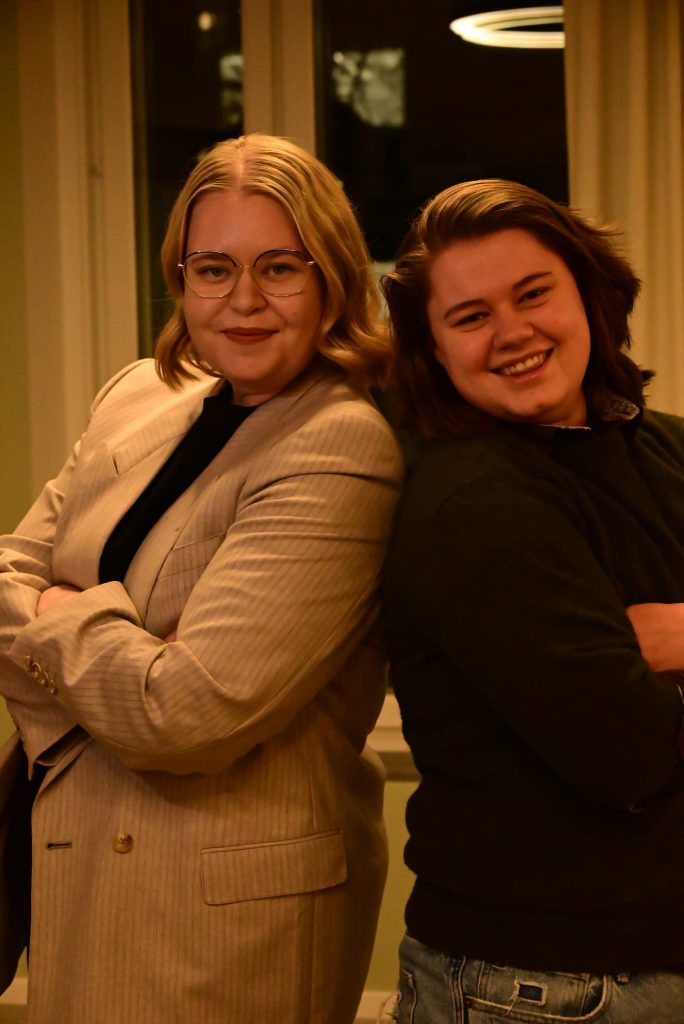
Picking free-standing elective courses – Translational Physiology and Pharmacology edition
To make the most out of your master’s experience, you should try to tailor it to your interests as much as possible. One way to go about it is to pick the elective courses that you are the most interested in. And if these are not the courses offered within your chosen programme, don’t worry, there are still ways to go around that. I myself ended up picking elective courses offered by the programme, but I interviewed some of my friends and classmates who shared their experience about the process of signing up to electives outside of the Translational Physiology and Pharmacology programme offered ones.
Meet Pinja & Tina!
Pinja has moved to Sweden from Finland. She has graduated from Centria University of Applied Sciences with a BSc in Chemical Engineering as well as from LAB University of Applied Sciences with a nursing degree. She has now specialised in interventional cardiology and currently works at a medical technology company with a project focused on developing solutions for heart failure patients. She’s also the head of the speaker team for TEDxKI.
Tina is originally from Germany, but did her BSc in the Maastricht Science Programme at Maastricht University. She has specialised in neuroscience and, similarly to Pinja, Tina is also very involved in TEDxKI as she’s the co-lead for this year’s event.

1. What elective courses did you do?
Pinja: I took Artificial Intelligence in Drug Discovery (7.5 credits from Uppsala University) and Safe Medical Devices (7.5 credits from KTH). From KI, I took Good Clinical Practice (GCP) in Clinical Pharmaceutical Trials (3.5 credits).
Tina: I did the Introduction to Brain Imaging in Neuroscience: With a Focus on MRI, PET, EEG and MEG Methods (7,5 credits) which is a KI free-standing course as well as some courses offered by the programme: Searching, Writing and Presenting Science and Information Literacy (4 credits) and GCP and Clinical Pharmaceutical Trials (3,5 credits).
2. How did you find an elective course outside of the offered options?
Pinja: We were discussing at KI in a session with the programme directors, that there is a possibility to find a freestanding course or do some project work for the elective course slots. Within the master’s programme there were only 4-5 options given to us, so I already knew then that I would go to University Admissions to see if I could find one or two courses that would match my interests. I was keen to learn more about bioinformatics, since my background is in healthcare, and I don’t have so much experience in bioinformatics, and the course that the programme offered was very brief and very broad.
Also, one of my long-standing career goals has been to work within medical devices and my master thesis was also going to be involving developing medical device, so the course on Safe Medical Devices would make me a good candidate for industry, as it gives information on all regulatory points and how to achieve developing a sustainable medical device to market. All in all, the elective courses would give me a more well-rounded education that would help me achieve my own goals.
Tina: I chose to do the Introduction to Brain Imaging course, because the elective courses offered by the programme didn’t give me enough insight into my specialisation of neuroscience. So I found this course through the University Admissions site and just let the programme coordinator know that I’d like to sign up for it.
3. How hard was it to get the course approved by the programme? What did you have to do?
Pinja: It was not actually hard at all, because I already chose courses that would fit the programme quite well. I sent an email to the programme director and there was no issue in accepting those courses. I applied for the courses as usual via University Admissions and then started the course within their respective times. After completing the courses, my credits that are registered in Ladok, will be transferred into the programme credits under “freestanding elective course” or something similar, the course name cannot be mentioned in the KI certificate as they did not provide the course. In addition, I will also receive a certificate from the respective universities, where I took the courses.
Tina: The approval was very quick and easy and didn’t require anything more than letting the programme coordinator know which course I’d like to take. Then internally they handled all of the registration and other administrative things as it was a free-standing course offered by KI.
4. What are some of the things you would recommend for the student’s interested in freestanding courses to think about?
Pinja: One important point to keep in mind is that KI does not allow the study pace to exceed 100%, which means that if you take additional courses at KI, you must be very careful with the study pace and talk to the programme director beforehand. The actual pace of the courses in my opinion is manageable since the freestanding courses only have distance lectures.
Another, maybe even more important fact is, that if you have a residence permit in Sweden, it is most likely tied to your studies at KI, and this doesn’t allow a lot of flexibility in taking courses outside of KI, because you run the risk of losing your permit. Another thing is the finances, if you are entitled to any student support that is tied to KI, they might also be cut it unless you provide a certificate of registration.
All in all, the bureaucracy takes a bit of time to get around, but if you have specific courses in mind, I would still encourage you to apply. Also, as far as I have heard from my friends at university the study pace is quite okay, so I would still recommend browsing through University Admissions because they have amazing course selection, it is unfortunately only free of cost to students from EU/EEA.
Tina: Although the process of applying to the course was super easy, the process of doing the course was a bit harder. That’s because, of course, it wasn’t in synchrony with all of our other courses and lectures. So sometimes I had to be in two lectures at once: a Zoom as well as in-person class and try to listen to the two at the same time because both were mandatory to attend.
Also what you should really consider is that free-standing courses can be done online from anywhere. So if you want to have a little semester where you can travel, then this is probably the best time for it. As it’s very likely that you’ll have a few very busy weeks and then a great opportunity to have a few weeks off from university, when all of your friends will still be in class.
Additionally, it gives you a little bit more freedom in terms of meeting people from outside of your course and having connections in different worlds. For example, most of the lecturers for the Brain Imaging course were not from KI, but rather from universities like Harvard, Johns Hopkins and different London-based ones, which was really cool. So you also get contacts and email addresses outside of your own university, which are potentially great for later phases in your career such as during your PhD studies.
So that’s everything related to what it’s like to find and apply for a free-standing course in the Translational Physiology and Pharmacology programme in the third semester. Thank you to Pinja and Tina for sharing their experience! If you have any specific questions on the electives, then it’s best to contact the programme coordinators for more details.

Karolina - Translational Physiology and Pharmacology
I am Karolina and I am a digital ambassador and a blogger for the Master’s Programme in Translational Physiology and Pharmacology here at KI. I was born and raised in Estonia, but for the past five years I have lived in the UK where I studied biomedical sciences with a focus on pharmacology. Outside of school I like baking with friends as well as doing water sports. When the weather starts to get warmer, I look forward to kayaking through Stockholm's world-famous archipelago.

0 comments